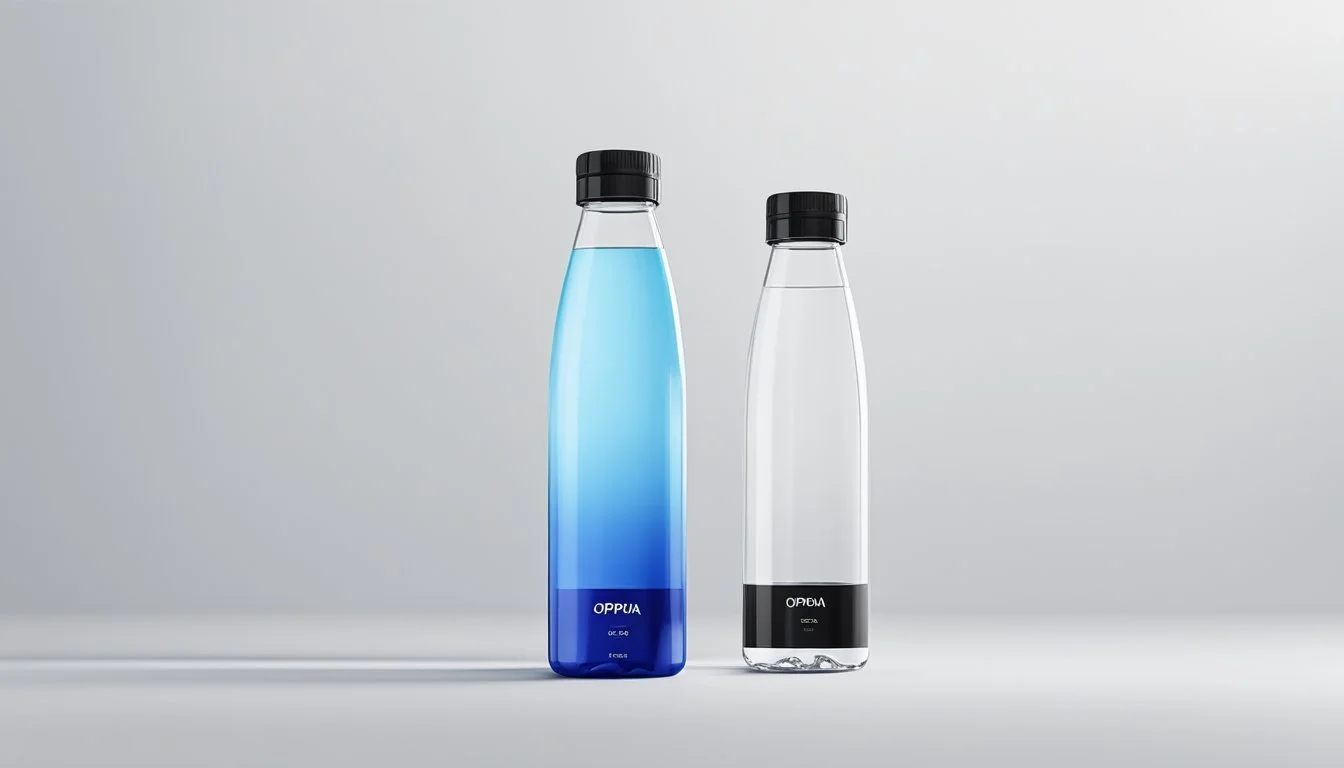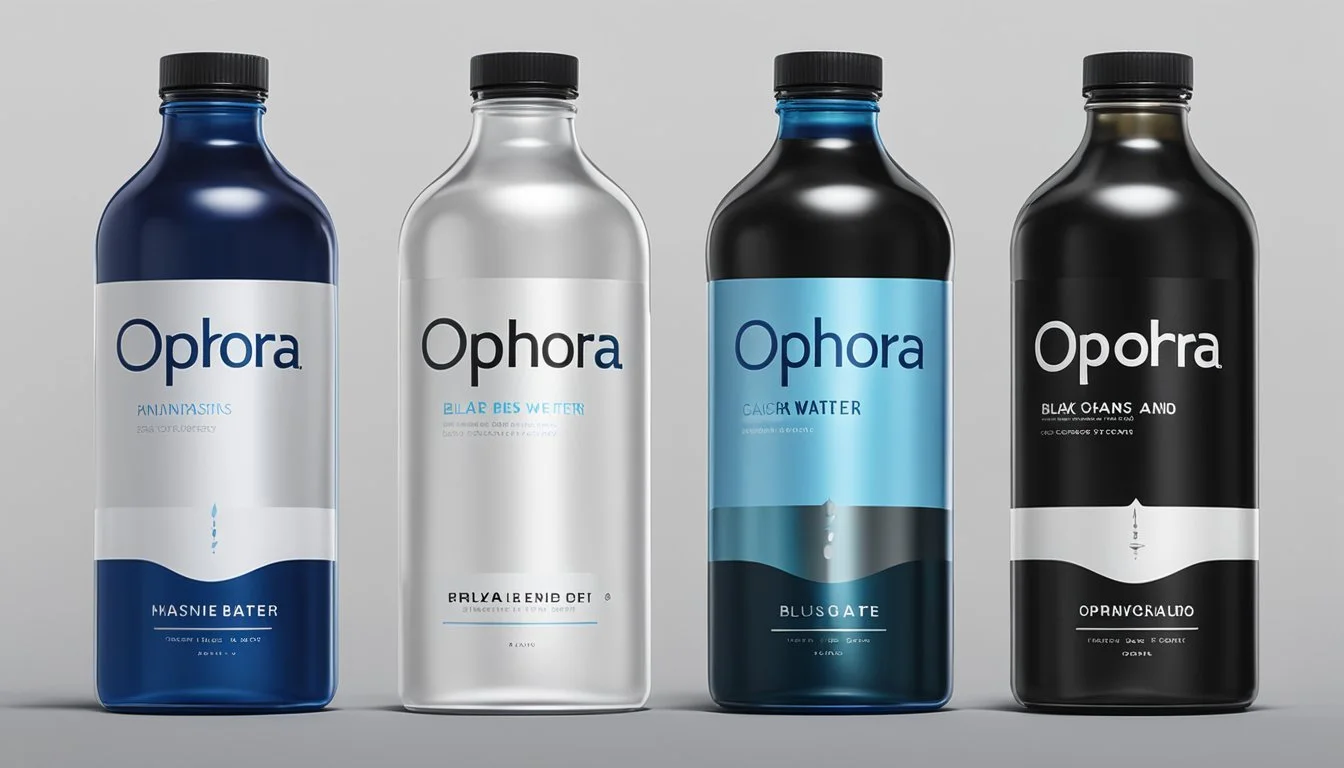Ophora vs. Blk
Comparing Premium Bottled Water Brands
When it comes to premium bottled water, two brands often come to mind: Ophora and blk. Both claim unique benefits and cater to a discerning consumer base. Ophora is celebrated for its ultra-purified water that's infused with oxygen, making it an appealing choice for those seeking enhanced hydration. On the other hand, blk. water stands out due to its deep black color, a result of fulvic trace minerals, which are touted to offer various health benefits.
The price point for these brands reflects their premium status. Ophora's oxygen-enriched water typically comes at a higher cost, positioning itself as a luxury item. Blk. water's distinct appearance and the supposed health perks of fulvic minerals have also captured consumer interest, although it carries a hefty price tag as well.
For consumers prioritizing taste and purity, Ophora might be the better choice. Those intrigued by the potential health benefits of fulvic minerals and the novelty of a black beverage may lean towards blk. Ultimately, the decision hinges on individual preferences and health priorities.
Understanding Bottled Water
Bottled water comes in various types, each offering distinct properties and sources. Below is an overview of different types of bottled water:
Natural Spring Water:
Sourced from an underground formation, this water naturally flows to the surface. It retains its mineral content, making it a popular choice for those seeking natural hydration.
Purified Water:
This water goes through extensive filtration processes to remove impurities. These methods include reverse osmosis, distillation, and deionization, resulting in a very clean product.
Mineral Water:
Containing minerals and trace elements, mineral water comes from subterranean reservoirs. The mineral content is natural and adheres to strict labeling standards.
Artesian Water:
Sourced from a well tapping a confined aquifer, artesian water is under natural pressure. It is prized for its pure taste and balanced mineral content.
Distilled Water:
Distillation involves boiling water and then condensing the steam back into a liquid. This process removes all dissolved minerals, producing very pure but flat-tasting water.
Each type of bottled water offers specific benefits, catering to different preferences and needs. When selecting bottled water, consumers should consider the source, processing, and mineral content to suit their individual health and taste preferences.
Evaluating Water Quality
When comparing Ophora and blk, it's crucial to assess the aspects related to taste, mineral content, safety protocols, and the levels of dissolved solids and pH.
Taste and Palatability
Taste plays a significant role in choosing bottled water. Ophora claims to offer a smooth and crisp taste, often attributed to its unique purification process which removes impurities and adds oxygen. Consumers frequently describe it as fresh and clean.
Blk, on the other hand, has a distinct taste due to its fulvic trace minerals. It is often described as earthy or slightly bitter. While some may appreciate this unique flavor, others might find it off-putting.
Mineral Content and Health Benefits
Mineral content varies between these brands. Ophora is fortified with essential minerals like calcium and magnesium, which are known to support bone health and metabolic functions. This enhances its nutritional profile.
Blk water contains fulvic minerals, which proponents claim can improve nutrient absorption and detoxification. Additionally, it is marketed as alkaline, which supporters believe can help balance the body's pH and promote better hydration.
Safety Standards and Regulation
Both brands adhere to regulations set by the FDA and EPA to ensure their products are safe for consumption. Ophora follows stringent quality control measures, ensuring their bottled water meets high safety standards, free from contaminants and heavy metals.
Blk also complies with the Safe Drinking Water Act, maintaining robust quality control. It ensures the absence of harmful substances like fertilizers and plastic-derived chemicals, as studies have raised concerns about these contaminants in bottled water.
Total Dissolved Solids and pH Levels
Total Dissolved Solids (TDS) and pH levels are critical in evaluating water quality. Ophora typically has a lower TDS value, indicating fewer dissolved minerals which contribute to its clean taste. Its pH level is usually balanced around 7, reflecting its neutral nature.
Blk water, due to the added fulvic minerals, has a higher TDS count, which might account for its unique taste. Its alkaline nature pushes its pH levels higher, often above 8. This is marketed as beneficial for combating acidity in the body and improving hydration efficiency.
Brand Profiles
This section provides an overview of Ophora and Blk water, examining their origins, benefits, and market positioning.
Ophora Water
Ophora Water is renowned for its purity and advanced filtration methods. The company filters its water through multiple stages, including reverse osmosis, to remove impurities.
A key selling point is its oxygenation process. This entails infusing water with oxygen, which the company claims improves hydration and promotes wellness. Ophora also focuses on sustainability, using eco-friendly bottles and packaging materials. Priced on the higher end, it targets consumers seeking premium quality and enhanced hydration benefits.
Ophora Water often markets itself towards health-conscious individuals and athletes, emphasizing its scientific approach to water purification and oxygenation.
Blk Water
Blk Water is distinctive for its black appearance, stemming from fulvic trace minerals added to the water. These minerals give Blk its unique color while purportedly offering several health benefits.
Blk Water is alkaline and advertises an increased ability to aid in pH balance and detoxification. Priced between $2-4 per bottle, Blk Water positions itself as a premium option within the bottled water market.
The brand captures attention due to its unconventional look and the health claims associated with fulvic mineral content. Blk Water often markets itself towards consumers interested in wellness trends and unique product experiences.
Comparative Market Analysis
When comparing Ophora and Blk Water, several key differences and market positions emerge. Ophora emphasizes purity, oxygenation, and scientific backing, appealing to health-conscious and athletic demographics. Its higher price tag reflects these premium features.
Blk Water stands out with its unusual black color and fulvic mineral content, which it claims to provide detoxification and pH balancing benefits. This positions it as a trend-setting and health-oriented brand.
While both cater to premium markets, Ophora leans towards science-driven health benefits, whereas Blk focuses on unique selling points and wellness trends. Price points for both are higher than average bottled waters, justifying their market positioning as high-end hydration solutions.
Health and Hydration
When it comes to the health and hydration benefits of Ophora and blk. water, several key factors should be considered, including how well each water hydrates the body and the role electrolytes play in this process.
Hydration and Human Health
Proper hydration is essential for maintaining numerous bodily functions, including temperature regulation, joint lubrication, and nutrient transportation. Both Ophora and blk. water are designed to offer superior hydration, but they do so in different ways.
Ophora water is infused with oxygen, which some believe enhances the body's ability to absorb water more rapidly. This oxygenation could potentially improve athletic performance and speed up recovery times. Hydrogen-rich water, a feature of Ophora, is also thought to provide antioxidant benefits, although more research is required to confirm this.
blk. water contains fulvic trace minerals, which are claimed to enhance nutrient absorption and promote better hydration. These minerals include a range of micronutrients that can help replenish those lost through sweat and other bodily processes. Fulvic acid, a component of blk. water, has been studied for its potential health benefits, including improved gut health.
The Role of Electrolytes in Hydration
Electrolytes are crucial for effective hydration as they help regulate fluid balance, nerve function, and muscle contractions. Ophora water includes an enhanced level of naturally occurring electrolytes, which can be particularly beneficial for athletes or those who engage in intense physical activity. These electrolytes include sodium, potassium, magnesium, and calcium.
blk. water's fulvic trace minerals also contain electrolytes, but in potentially different ratios and concentrations compared to Ophora. These differences can impact how effective each water is in maintaining electrolyte balance, especially during prolonged or intense exercise. By replenishing electrolytes more efficiently, both types of water aim to prevent dehydration and related symptoms like cramps and fatigue.
The choice between Ophora and blk. water might come down to personal preferences on taste, specific electrolyte needs, and the overall desired health benefits.
Environmental Considerations
Examining the environmental impact of bottled water brands, particularly Ophora and Blk., involves looking at their packaging and sustainability efforts, as well as the effects of their water sourcing on ecosystems.
Packaging and Sustainability
Ophora uses BPA-free plastic bottles, which are less harmful compared to traditional plastics. They also offer a reusable bottle program to incentivize sustainability among consumers. This approach reduces plastic waste and encourages a more environmentally friendly lifestyle.
Blk. Water opts for standard PET plastic bottles, similar to many other brands. This material is recyclable but still contributes to plastic pollution when not disposed of properly. Efforts to shift towards boxed water or fully biodegradable packaging could enhance their environmental image.
Water Source and Ecosystem Impact
The water source for Ophora is predominantly natural groundwater, sourced from protected aquifers. This careful sourcing minimizes disruption to local ecosystems. Moreover, their commitment to maintaining the purity of these sources helps in preserving natural water habitats.
Blk. Water sources its water from several locations, which are often commercially operated spring water sites. While efficient, this can affect local ecosystems, particularly due to the high levels of water extraction required to meet demand. Ensuring sustainable withdrawal rates and protecting source origins are crucial for minimizing environmental damage.
Consumer Convenience and Lifestyle
Bottled water brands like Ophora and blk. cater to different aspects of consumer convenience and lifestyle. While each brand offers unique features, both aim to satisfy the varying needs and preferences of today's health-conscious individuals.
The Convenience Factor
Ophora and blk. water provide portability and ease of access, essential for busy lifestyles. Ophora’s focus on ultra-purification might appeal to those interested in health and wellness. The product’s availability in various packaging sizes makes it easy to carry for different occasions, whether at the gym, office, or outdoors.
Similarly, blk. water, with its distinctive black color, offers convenience with a twist. It stands out not just for its looks but also for its added fulvic trace minerals. Its unique properties might attract consumers looking for a functional beverage. Both brands ensure that their products are readily available in stores and online, enhancing the convenience aspect significantly.
Cultural Trends and Water Sommeliers
A growing cultural trend in the United States is the rise of water sommeliers, experts who pair water with food and educate consumers about different water qualities. This trend reflects a broader interest in premium bottled waters and their unique characteristics.
Ophora, with its high-end purification process, aligns well with this trend. Its clean and pure taste could be an attractive option for water connoisseurs and sommeliers.
Blk. water, on the other hand, capitalizes on the visual and functional appeal with its fulvic acid content. This appeals to a niche market interested in health benefits and novelty, fitting well within the United States’ dietary supplement trends.
Both brands tap into these evolving cultural trends, offering products that cater to a sophisticated consumer base interested in more than just hydration.
Cost Analysis
Price is a significant factor when evaluating bottled water.
Blk. water is marketed as a high-end hydration source. It typically costs between $2 and $4 per 16-24oz bottle. This places it at a 300% price premium over many value water brands. Consumers pay a higher price for its unique appearance and purported health benefits from fulvic trace minerals.
Ophora water is similarly positioned as a premium product. Pricing information for Ophora varies based on the type and quantity purchased, but it generally also falls into the higher-end category.
To better understand the cost, let's compare them in a simple table:
Brand Price per Bottle (approx.) Key Features Blk. $2 - $4 Unique black color, fulvic trace minerals Ophora Varies Advanced purification, oxygenation
For consumers seeking the best bottled water experience, understanding these costs helps make informed decisions.
While both brands offer premium products, the choice between them may come down to what specific qualities or features one values more—whether it's the innovative minerals in Blk. or the advanced purification methods in Ophora.
Final Recommendations
When choosing between Ophora and blk. Water, several factors merit consideration.
Taste
Ophora offers a crisp, refreshing flavor. Many find it pure and clean, without any aftertaste.
blk. Water has a unique taste due to its fulvic trace minerals, which some people appreciate for its unconventional profile.
Hydration
Ophora is designed to enhance oxygen intake, potentially improving hydration levels.
blk. Water includes added electrolytes and minerals, supporting hydration with a different approach.
Environmentally Friendly
Ophora focuses on sustainability in their manufacturing process.
blk. Water emphasizes its natural composition, yet details on environmental impact are less clear.
Price
Ophora is typically more expensive, reflecting its purification process and added oxygen.
blk. Water can be moderately priced, depending on the targeted market and availability.
Quality Control
Both brands maintain rigorous quality standards, ensuring clean and safe water.
Ophora undergoes meticulous purification for optimal purity.
blk. Water integrates fulvic acid and electrolytes, backed by consistent quality checks.
Convenience
Both water brands are widely accessible through online retailers and specialty stores.
Ophora is often found in wellness centers, while blk. Water can be readily available in health food stores.
Choose Ophora for a clean taste and enhanced oxygen content. Opt for blk. Water if seeking unique minerals and distinct flavor.
More About Ophora
Mountain Valley Spring Water vs Ophora: Which Bottled Water is Better?
Ophora vs Kirkland Signature: Which Bottled Water is Better?
Richard's Rainwater vs Ophora: Which Bottled Water is Better?
Whole Foods Italian Still Mineral water vs Ophora: Which Bottled Water is Better?







